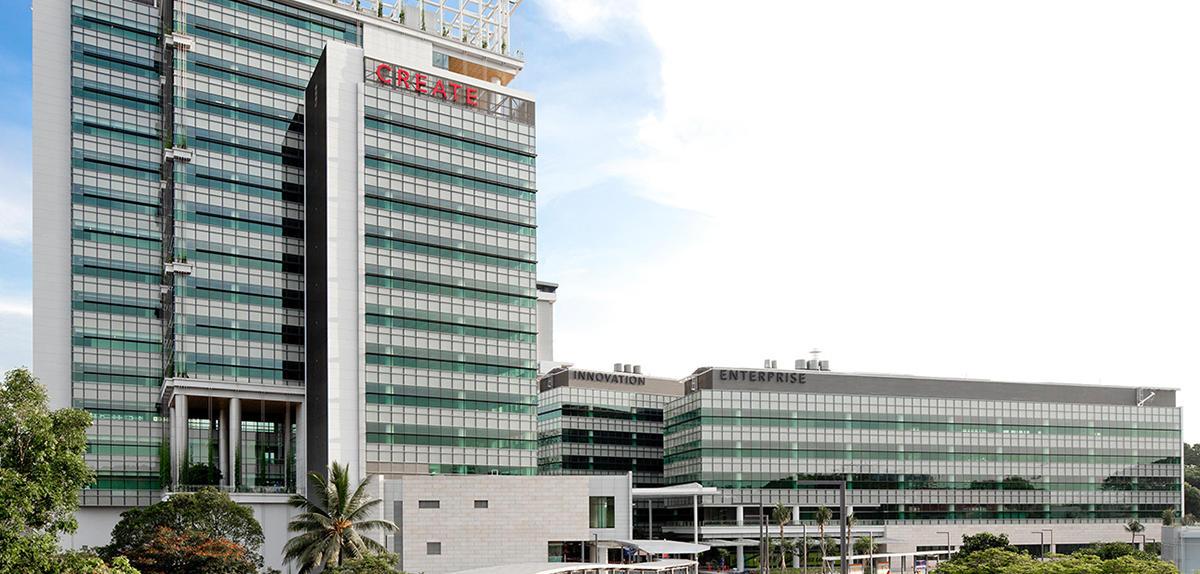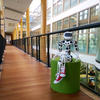You are here
Leading CNRS project on hybrid AI launched in Singapore

DesCartes – behind this very French name is one of the CNRS’s largest collaborative projects, the Programme on Intelligent Modelling for Decision-making in Critical Urban Systems, which is dedicated to hybrid artificial intelligence. With a consolidated budget of €35 million over five years, this programme was recently selected by the government of Singapore, and will be based at its international research hub, the CREATE campus.1 The CNRS and 12 universities and Grandes Écoles2 are involved on the French side, together with five Singaporean universities3 and the country’s A*STAR institute.4 “This ambitious programme will enable us to set our priorities. It is not a response to a call for projects, as it was the CNRS that made a proposal to the National Research Foundation (NRF),”5 points out Dominique Baillargeat, Director of the very first CNRS foreign subsidiary, CNRS @ CREATE, which has been based at the CREATE campus in Singapore since 2019.
AI: France – Singapore, a shared ambition
The primary objective of the DesCartes programme, initiated in January 2020 under the management of Francisco Chinesta,6 is decision-making in “critical urban systems”, one of the many research challenges related to the “smart city” concept. “Singapore's CREATE hub did not have a project in this field. With DesCartes, the CNRS has secured a prominent position within the campus, while responding to the needs identified by Singapore for implementing its smart city policy by 2030, via its national AI strategy launched in 2019, and led in particular by the NRF's AISG programme,” Baillargeat explains. DesCartes also makes it possible to participate in the French national artificial intelligence plan, as four Interdisciplinary Institutes of Artificial Intelligence (3IA) have been created, and could potentially take part. “This is one way to extend the research conducted at these institutes, and to expand one of its components to include Singapore. The CNRS has made AI and its applications one of its priorities, especially in connection with international partnerships.” The broader context is also largely favourable, as the two countries recently established a strong AI research collaboration, concentrating on four specific areas: data and its applications; verifiable and explainable AI; natural language processing; and AI and human-machine interaction.
“This is about combining the strong expertise of both countries,” Baillargeat adds. The Singaporean consortium is renowned worldwide in the field of smart cities and disciplines central to AI. The French consortium, on the other hand, enjoys international recognition in AI hybridisation technology and engineering, as well as in the human and social sciences, which will be decisive in placing citizens at the heart of the programme.
From optimising the electricity network to managing traffic for delivery drones
DesCartes will develop hybrid AI methods that combine AI with models based on knowledge (physics, engineering) in order to ensure reliable real-time decision-making that “focuses on individuals” and is “in step with society”. This will all be in response to complex situations related to critical urban systems in the context of Singapore's “Smart Nation” initiative. This research will, for example, be applied to urban mobility and energy management, or to anticipate the needs of future transportation networks, intelligent industries, and smart buildings. “For instance, we intend to develop solutions that optimise supply with demand in the electricity network or relieve traffic for drone taxis or delivery drones, in addition to developing smart predictive maintenance applied to industrial tools,” Baillargeat points out. This includes urban systems that will be capable of analysing data on the population's use of services in order to make optimisation decisions. These tools will be developed by some 30 PhD students, 50 postdoctoral fellows, and more than 80 academics and researchers from Singapore and France, some of whom will be based in the City-State for long-term stays financed by the programme.
“Singapore is a genuine showcase for innovation, one that is open to emerging technologies. It is the ideal place for demonstrating that hybrid AI is a groundbreaking technology suitable for the critical infrastructure of smart cities.” The ambition of DesCartes is to deploy this technology on industrial-scale case studies by involving governmental agencies and local industries. “The applications, of course, will be global.”
___________________________________
CNRS @ CREATE, the organisation's first foreign subsidiary
CNRS @ Create was designed as a programme operator, and integrated within the Campus for Research Excellence and Technological Enterprise (CREATE) for establishing research collaborations. Set up by the NRF in 2007, and devised as an international research centre in Singapore, CREATE develops international scientific cooperation by funding major programmes conducted among its partners, earmarking SGD$100-120 million per year for research projects. The NRF selects CREATE partners solely on the basis of scientific excellence and their desire to engage in this collaborative approach. Today the CREATE tower is home to two major Singaporean universities, the National University of Singapore and Nanyang Technological University, in addition to nine foreign partners including the MIT, ETH Zurich, the University of Cambridge, and UC Berkeley. “The NRF wanted the CNRS to be part of the club. It was the first research organisation to be invited within this framework,” Baillargeat stresses.
In addition to the DesCartes programme, the CNRS subsidiary in Singapore is coordinating four projects at different stages of development. Three were initiated in response to “intra-CREATE” calls for projects, in other words to finance collaboration between CREATE's 11 members, ranging from Singaporean universities to the world's leading research centres, such as the MIT and the University of Cambridge. CNRS @ CREATE is the primary leader for the EcoCTs project as part of the “Cities” call for proposals, in collaboration with the National University of Singapore (NUS) and the Agency for Science, Technology and Research (A*STAR), which proposes to develop “a synthetic biology for a circular bioeconomy”. Two of the subsidiary's projects were selected in response to the Intersection of Engineering and Health call for proposals: Calipso, on “cell growth managed by artificial intelligence”, for which it is the primary leader; and ScaNCellS, for “3D cell printing”, for which it is assisting Nanyang Technological University. Finally, a fourth chemistry project, called “Bubble: from food waste to chemical products through sonochemistry”, was recently launched for a period of 18 months. An interdisciplinary, flexible, and responsive instrument, the CNRS's first subsidiary is at the heart of the organisation's international strategy.
- 1. The Campus for Research Excellence and Technological Enterprise (CREATE) was created by the National Research Foundation2 (NRF) in 2006 to boost the dynamism and diversity of Singapore's R&D ecosystem, by bringing together some of the most prestigious international research centres such as the MIT, ETH Zurich, the University of Cambridge, the University of California Berkeley, the Technical University of Munich, and the Hebrew University of Jerusalem.
- 2. Université Paris-Saclay, Université Toulouse III - Paul Sabatier, Université Lyon III - Jean Moulin, Université Paris 8, Université de Bordeaux, École Nationale de l’Aviation Civile, Université Paris Dauphine, Université de Strasbourg, Arts et Métiers, INP Grenoble, INP ENSEEIHT, and École Normale Supérieure.
- 3. Nanyang Technology University, National University of Singapore, Singapore University of Technology and Design, Singapore University of Social Sciences, and Singapore Management University.
- 4. Agency for Science, Technology and Research. A*STAR is Singapore's national R&D agency.
- 5. Reporting directly to the Prime Minister's office, the NRF identifies national priorities and finances the country's strategic research programmes, like France's ANR.
- 6. Engineering academic at the PIMM (Laboratoire Procédés et Ingénierie en Mécanique et Matériaux – CNRS / CNAM / Arts et Métiers ParisTech) laboratory, specialist in advanced simulation, and holder of the ESI Group – Arts et Métiers chair.












